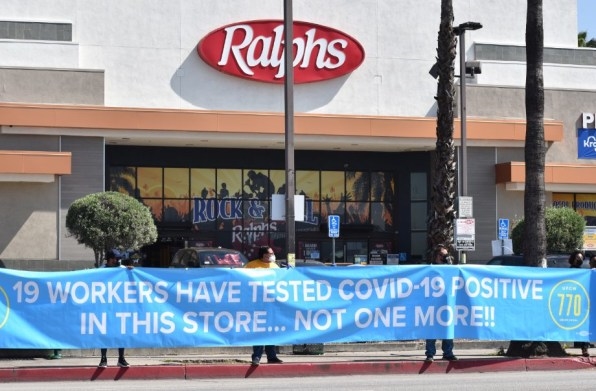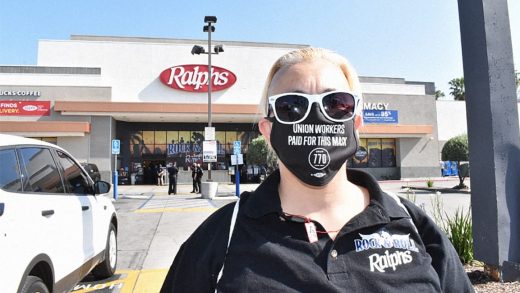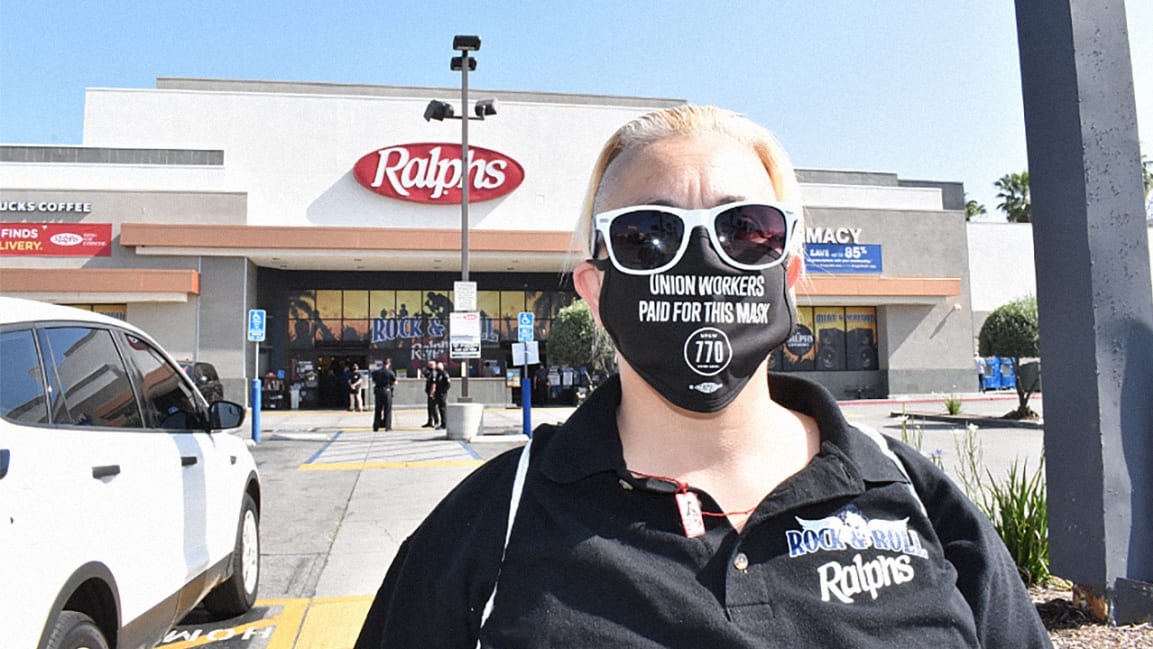Grocery store workers keep getting COVID-19, but have to fight their companies to pay for testing
In the past two months, grocery store employees have suddenly found themselves on the front lines of a pandemic. At a Ralphs grocery store in Hollywood, 21 employees tested positive for COVID-19, sparking protests by workers represented by the United Food and Commercial Workers union and calls for heightened protections. But after Kroger, which owns Ralphs and Food 4 Less, promised to test all 22,000 of its Southern California grocery employees, the union says the company has backpedaled, and will only test those with symptoms or who are in medical need.
“That’s what we were afraid of. We were worried they were going to pull back in some way, because frankly [that agreement] was so unlike them,” says John Grant, president of UFCW Local 770. “They’ve been dragging their feet, fighting us tooth and nail all along the way.”
Ralphs and Food 4 Less employees have now protested their working conditions three times all the week of April 27, at two Food 4 Less locations with confirmed COVID-19 cases and at the Hollywood Ralphs where 21 of 129 total employees—16% of the store’s unionized workforce—have tested positive for the coronavirus. That number doesn’t include management, or other workers such as Instacart employees who come in and out of the store frequently, Grant says. Kroger has even refused to give its employees masks, according to Grant. The union bought 20,000 cloth masks and distributed them to employees (A Kroger spokesman says that the company began offering its own masks when the CDC recommended people wear them) . The masks read: “Union workers paid for this mask.”

“It’s been a fight in terms of compliance. They’ve even transferred people out of that store in Hollywood, to other stores, and [workers] have tested positive in the other stores, so they’re doing their own spread,” says Grant. “Instead of community spread, you’ve got corporate spread.”
News that employees won the right to COVID-19 testing broke Friday night when a Kroger spokesperson told Los Angeles TV station KNBC that testing will start in mid-May. Kroger then clarified with the news channel, which called UFCW, according to Grant, and when the union called Kroger management back, they were told the media report had gotten it wrong from the beginning.
In an email to Fast Company, a Kroger spokesperson confirmed that free COVID-19 testing is available “based on symptoms and medical need” to the company’s entire 500,000 workforce, and added that the company has instituted other safety measures including gloves and face coverings, plexiglass shields at checkout stands, floor decals to ensure physical distancing, limiting store capacity, and increased sanitization processes. The testing offered will be a combination of self-administered kits and the company’s public drive-through testing sites. “At Kroger, the safety and health of our associates and customers remains our top priority during this unprecedented time,” said Tim Massa, Kroger’s senior vice president and chief people officer, in a statement.
But testing only symptomatic workers or those in medical need isn’t enough, the union says, because asymptomatic workers may still be spreading the virus. “We think regularly scheduled tests in all retail establishments makes sense,” Grant says. “Is the effort to get by with paying as little as possible or is the effort to try and curb this and protect those who are doing the work?”
Along with testing of all employees, the workers have other demands to raise safety in Ralphs and Food 4 Less stores: When a worker in a store tests positive, they want that store to shut down for 24 hours for professional cleaning and want testing available on site so workers don’t have to wait for hours in other facilities. They also want to form health and safety committee with workers from stores as well as management who can help ensure compliance with a safety checklist put out from the Los Angeles County Board of Health. Finally, they’re asking for governmental review and approval before a store with a confirmed COVID-19 case reopens.
“We think [these] make sense. These stores are doubling, tripling sales, and the health of these workers are essential,” Grant says. “It’s not something to be played around with. These workers did not sign up to be health officials during a global pandemic.” Grant has heard from grocery store workers that managers are looking to replicate March sales, when many shelter-in-place orders first began and people rushed to grocery stores en masse. “They’re drive for increased sales defeats worker safety, it seems, time and time and time again,” he says.
(29)



